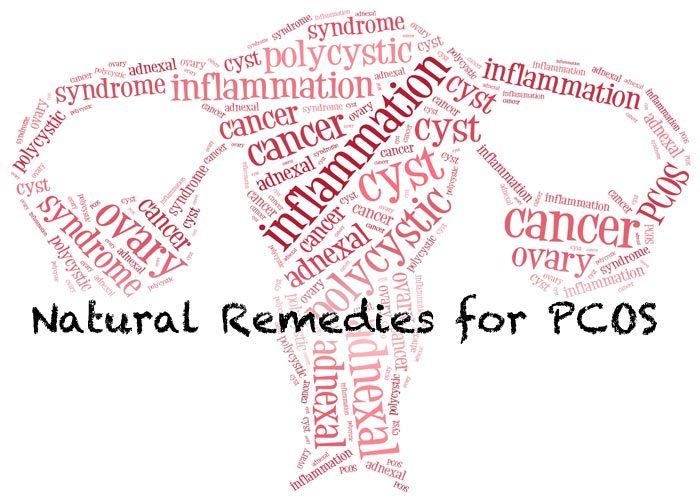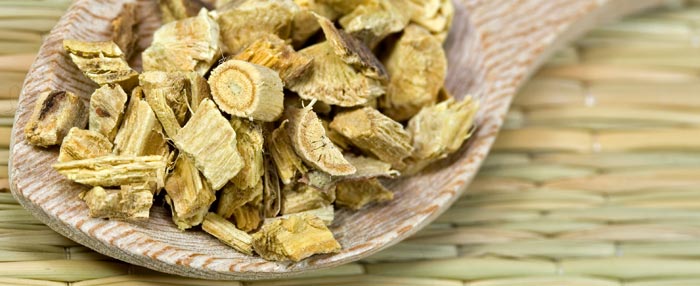Last Updated on March 5, 2018 by Marc Seward

Polycystic Ovarian Syndrome (PCOS) affects more than 5 million women in the United States. PCOS alters hormones and sometimes can cause infertility. Although it is uncertain what causes this endocrine disorder, it is characterized through a variable of symptoms, including acne, excessive facial hair, weight gain, multiple cysts on the ovaries, lack of ovulation, infrequent or absent menstruation, and infertility.

PCOS also significantly increases the probability of miscarriage or infant death at or around the time of birth. Women affected by this disorder often have raised levels of male hormones, namely testosterone, and decreased levels of the female hormone progesterone.
Women with PCOS may also have higher than normal levels of the hormone prolactin and may have trouble regulating their insulin level. If left untreated, PCOS can develop into more serious health issues such as diabetes, heart disease, osteoporosis, and endometrial cancer.
Currently there is currently no cure for this syndrome. There are however, lifestyle changes you can make and some natural remedies to get the symptoms under control. A healthy and natural plant based diet is always a good general health solution.
Diet
Diet is the first and most important step to regulating PCOS. One of the biggest problems of PCOS is insulin resistance. Insulin resistance increases the body’s insulin levels and therefore affects ovulation and the body’s ability to get pregnant.
This is also a red flag for the early stages of type 2 diabetes. If you are overweight, losing as little as 5% of your body weight will not only stabilize your blood sugar, but it will also significantly improve all of your symptoms of PCOS.
Including the following foods will not only improve your overall health, but they will also promote a quick recovery from PCOS:
Carbohydrates
When adding carbohydrates to your diet, it is important to choose the right kind of carbs and to balance them out with an equal amount of protein. When choosing carbohydrates, be sure to choose complex carbs that are whole grain or sprouted grain products.
Whole grain products are high in fiber and therefore great for regulating insulin levels. Carbs that are high in fiber include whole grain breads and cereals, barley, brown rice, bulgur wheat, beans, and whole grain pasta. It is best to avoid simple carbohydrates such as sweets and soda or white processed carbohydrates, which lack fiber or any nutritional value.
Protein
To balance your carbohydrate intake, its important to incorporate protein into your diet to keep your insulin levels in check. Adding foods like soy, milk, eggs, lean meat, fish, and milk products will help alleviate your PCOS symptoms. Avoid processed protein such as deli meat.

Fiber
A diet that is high in fiber is instrumental in treating PCOS. It not only slows down the absorption of sugars in the body, preventing an insulin spike, but it also increases healthy estrogen metabolism, decreasing abnormal androgen levels. Consider adding dark leafy greens, broccoli, celery, whole grains, and apples to your diet.
B-vitamins
Foods that contain b-vitamins alleviate symptoms of PCOS by promoting healthy functioning of the hormonal system while reducing androgen levels in the body. Try adding whole grains, nuts, and skim milk to your diet.

Low Glycemic Index Foods
Foods on the low glycemic index list break down slowly in your body and therefore prevent a dramatic spike and drop in your insulin levels. When including low glycemic foods into your diet, be sure to include, beans, lentils, kale, broccoli, asparagus, grapefruit, apples, walnuts, and almonds.
Water
There is no way around it, water is essential to your health, and this includes treating symptoms of PCOS. Drinking enough water helps to flush out any dangerous organisms or free radicals responsible for triggering PCOS.
To get your PCOS symptoms under control, the following foods should be limited or avoided in your diet:
• Sugar and sweets should be avoided
• Caffeine should be avoided
• Alcohol should be avoided
• Food additives and preservatives should be avoided
• Saturated fats intake should be reduced
Exercise
By exercising at least 30 minutes every day you alleviate your PCOS symptoms by lowering blood sugar levels, boosting metabolism, and shedding those extra pounds. Walking every day, running on a treadmill, swimming, or a Pilates class are all great ways to stay active and take control of your PCOS.

Natural Remedies for PCOS, Herbs and Supplements
In addition to exercise and a healthy diet, adding herbs and supplements to your PCOS treatment routine have shown to be instrumental in controlling symptoms of PCOS. When taking any herbs or supplements, be sure to consult your physician to ensure safe and effective use.
Cinnamon
Cinnamon not only helps reduce insulin resistance, but it also helps to stabilize monthly periods in women. To reap the benefits of cinnamon, trying sprinkling it on your food, such as oatmeal, yogurt, peanut butter sandwich, or cottage cheese.
- Another way to get your daily dose of cinnamon is to add one teaspoon of cinnamon powder to a glass of hot water. Drink daily for a couple months to get your symptoms under control.

Apple Cider Vinegar
Consuming apple cider vinegar helps control insulin levels. By controlling insulin levels, women also decrease their levels of testosterone. Apple cider vinegar also promotes weight loss and overall good health.
- Simply mix two teaspoons of apple cider vinegar in a glass of water and drink before meals. It is advised to start with a smaller dose of apple cider vinegar and gradually work up to the standard two teaspoons per glass, 2-3 times a day. After a few weeks, you should notice a decrease in your PCOS symptoms.
Fenugreek
Fenugreek is vital to women suffering from PCOS. Fenugreek stabilizes blood sugar and balances hormones. It has also believed to aid in weight loss, lower cholesterol, and promote heart health.
- Soak 3 teaspoons of fenugreek seeds in water for 6 to 8 hours. Consume one teaspoon of fenugreek seeds along with some honey first thing in the morning, on an empty stomach.
- Also take a teaspoon of fenugreek seeds 10 minutes before eating lunch and dinner. Take fenugreek daily for a few weeks to notice an improvement in your PCOS symptoms.
Spearmint Tea
Drinking a cup of soothing tea can help control growth of excess body and facial hair, reduce testosterone levels.
- To enjoy a cup of spearmint tea, boil one cup of water and add one teaspoon of dried spearmint leaves. Let steep for 10 minutes. Strain and drink this tea twice a day, everyday, for a couple weeks.
Chasteberry
Chasteberry relieves symptoms of PCOS and also addresses problems with menstruation, fertility, and hormones.
- To get your PCOS symptoms under control with chasteberry, boil one up of water and add one teaspoon of fresh or dry chasteberries and let steep fro 10 minutes. Strain and drink daily for a couple months to improve your PCOS symptoms.
Maca Root
Maca is an herb that is beneficial for women suffering from acne, irregular menstrual cycles, and irregular hair growth. This herb also balances hormones and insulin levels. Many people enjoy maca root in powdered form by adding it to their meals or in a smoothie.
Omega-3 Fatty Acids
Omega-3 fatty acids are vital to reducing androgen levels and improving insulin sensitivity, therefore alleviating symptoms of PCOS. You can get your omega-3s by taking a supplement or including foods such as flaxseeds, fish oils, salmon, halibut, almonds, walnuts, and soy.
Saw Palmetto
Taking a saw palmetto supplement helps to regulate irregular facial and body hair growth by inhibiting the production and release of DHT and 5-alpha reductase. This supplement also promotes the growth of thinning hair, and helps to reduce acne.

Licorice Root & White Peony
Licorice root is responsible for maintaining the healthy production and release of hormones and regulating insulin levels. Paired with white peony, these supplements reduce painful periods, decrease testosterone levels, and relax muscles in women suffering from PCOS.
Chromium
Chromium is a mineral helps the body regulate insulin and may improve blood sugar control. You can take a chromium supplement or eat foods that are rich in chromium such as bran cereals, whole wheat, onions, tomatoes, brewer’s yeast and oysters.

Vitamin D and Calcium
Getting enough calcium and vitamin D is important for protecting a women’s cardiovascular health as well as regulating glucose metabolism. Vitamin D and calcium supplements alleviate PCOS symptoms and also help regulate menstrual abnormalities.
Magnesium
Women suffering from PCOS tend to have low levels of magnesium. Studies have found that by taking a magnesium supplement, women improve their regulations of insulin and therefore decrease their potential for developing type 2 diabetes, heart disease, and also reduce their chances of suffering from a stroke.
Leave a Reply
You must be logged in to post a comment.